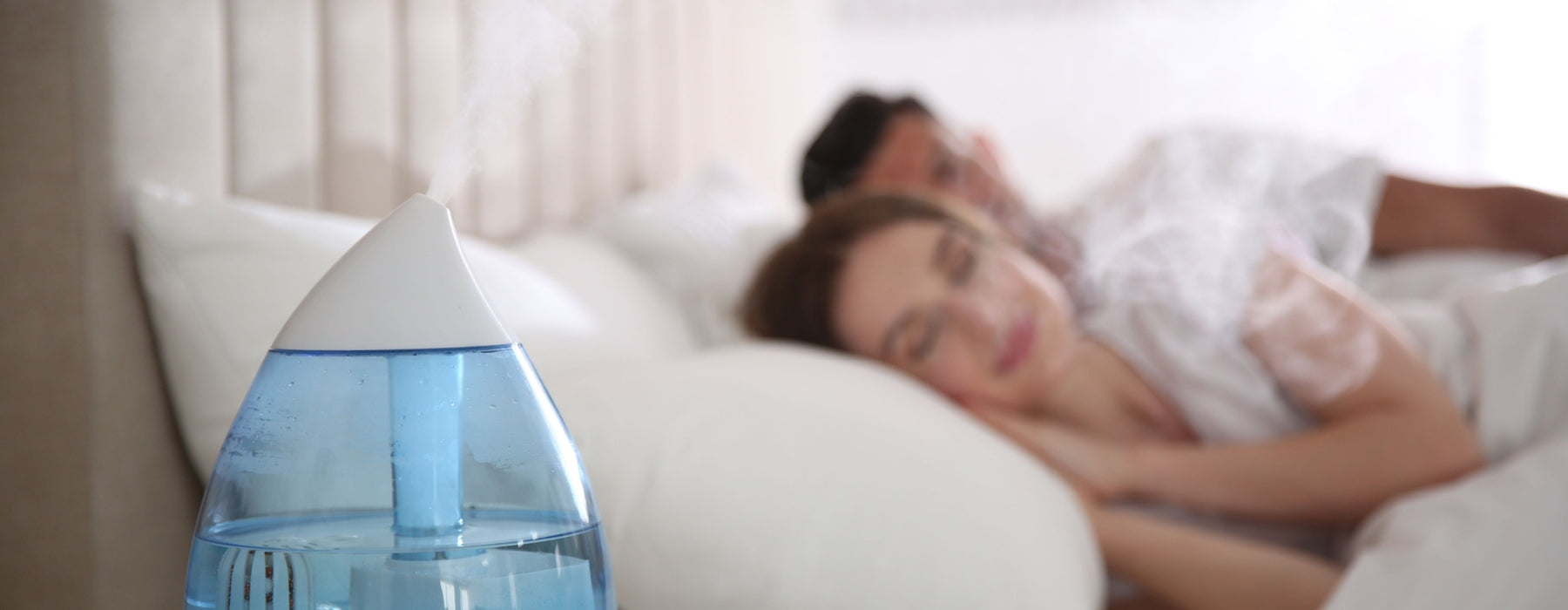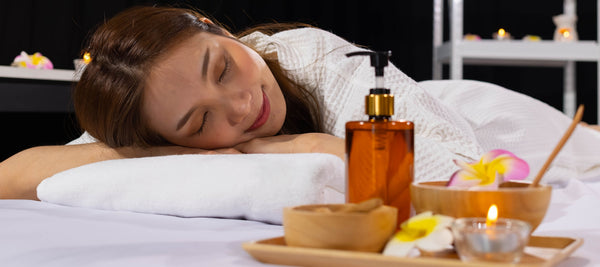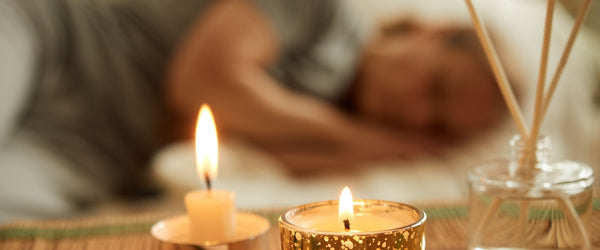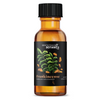
Your Comprehensive Guide to Using an Essential Oil Blend for Sleep
Across time and generations, there exists a persistent curiosity regarding the relationship between sleep and well-being. Sleep science has progressed significantly since the discovery of electrical brain waves and tools to measure them, such as the electroencephalogram.
This development has also paved the way for new avenues of research, including studies on how essential oils affect sleep patterns. While essential oils have long been speculated to have sedative and calming effects, researchers are now able to pinpoint the mechanisms of action through which essential oils can aid relaxation. This provides more than just anecdotal evidence of the effectiveness of essential oils as a natural sleep remedy.
If you’re thinking of using essential oils for sleep troubles or to help relax, this article is a comprehensive primer on which essential oils to use and how to use them.
How Do Essential Oils Help With Sleep?

Essential oils consist of several volatile compounds, such as terpenes and esters, that interact with the olfactory system when inhaled. The system is connected to the brain’s limbic system, which influences emotions and behavior. This means that the use of essential oils has the potential to moderate physiological and emotional reactions.
Certain compounds present in essential oils have been explored extensively for their regulatory effect on the central nervous system. Linalool is perhaps the most widely explored in experimental research, due to its presence in popular essential oils, such as lavender, ylang ylang, and clary sage. It is known to inhibit glutamate binding in the brain’s cerebral cortex, reducing excitatory activity and calming nerves.
Research also demonstrates that inhaling essential oils improves mental well-being and enhances cognitive function. As part of a 2023 study, 43 healthy adults used essential oil aromatherapy at night for 6 months. Results showed a marked improvement in cognitive activity measured by fMRI scans and learning tests.
This suggests that essential oils have the potential to improve sleep while delivering long-term benefits for brain health.
Best Essential Oils to Relax Before Bedtime
Finding calm and relaxation after a stressful day can be an uphill battle. Before hopping into bed, it is important to take some time and clear your mind. This will help you regulate emotions and prepare your body for restful sleep. Essential oils are a natural and effective way to reduce stress and calm your mind.
Lavender Essential Oil
Derived from the fragrant Lavandula angustifolia plant, the lavender essential oil is renowned for its calming properties. It is one of the most widely used essential oils in aromatherapy due to its versatile scent and therapeutic characteristics. It contains compounds, such as linalool, 1,8 cineole, and linalyl acetate that act on the central nervous system.
Lavender essential oil has been widely researched for its impact on anxiety-related conditions. The constituents of lavender essential oil penetrate rapidly into cell membranes, acting on neurotransmitters and calming nerve cell activity.
A 2015 study compared lavender essential oil to over-the-counter medications taken for anxiety. Researchers found that the effect of lavender on anxiety scores was comparable to lorazepam and paroxetine, commonly prescribed anxiolytics.
While it effectively alleviates feelings of anxiousness, lavender essential oil does not have sedating properties. This makes it a safe and effective therapeutic option to manage anxiety-related conditions and restlessness.
Black Seed Oil
Black seed, also known as black cumin, has consistently been lauded in traditional Persian and Asian medicine for its exceptional therapeutic potential. Avicenna’s ‘Canon of Medicine’, a medical text from the Medieval Islamic world, mentions black cumin as a remedy for weakness and anxiety. In the modern day, black seed oil is available in the form of essential oil steam distilled from the Nigella sativa plant.
Studies have found that black seed extract reduces levels of anxiety and depression by altering certain chemicals in the brain. Thymoquinone, the compound chiefly present in black seed, has anti-depressive, anti-inflammatory, and neuroprotective effects. It also reduces anxiety by modulating GABA and nitric oxide levels in the brain.
The findings from scientific investigations suggest that black seed oil can help individuals with anxiety and stress-related concerns.
Bergamot Essential Oil
Bergamot essential oil has a bright, cheerful scent making it a top pick in aromatherapy. It is extracted by mechanically pressing the rind of the Citrus bergamia orange. The essential oil contains several compounds noted for neurobiological effects, including linalool, linalyl acetate, and limonene.
Several clinical studies have examined the effect of bergamot essential oil on stress and anxiety, noting its mechanisms of action and therapeutic benefits. One study reported that participants treated with bergamot essential oil had lower corticosterone levels, corresponding to lower anxiety scores. In another study, bergamot essential oil was lauded for its potential to aid the management of mental disorders, including anxiety and depression. Participants inhaled bergamot essential oil for 15 minutes, after which researchers observed a significant improvement in their mental well-being.
You can incorporate bergamot essential oil into a meditation ritual to help alleviate anxiety. Diffusing the essential oil while you practice your routine will complement and enhance its calming effects.
Clary Sage Essential Oil
Clary sage essential oil has a strong reputation for its anti-anxiety and calmative properties. It is steam distilled from the flowers and leaves of the Salvia sclarea plant, a perennial herb native to the Mediterranean Basin. The essential oil contains compounds, such as linalyl acetate and linalool that act on the neuroendocrine system.
A 2010 study found that clary sage essential oil markedly reduced the stress hormone cortisol while increasing levels of plasma serotonin. These bioactivities suggest that clary sage has the potential for mood regulation and stress relief. Another research experiment conducted in 2014 found that clary sage essential oil had an antidepressant effect in healthy adult females.
In addition to its calming and mood-regulating benefits, clary sage has a pleasant, earthy aroma that does not overwhelm the senses. Massage it into the soles of your feet to relieve weariness and usher in sleep.
Best Essential Oils for Deep Sleep
Recently, extensive scientific inquiry has been undertaken to evaluate the usefulness of essential oils in promoting sleep and improving sleep quality. Research indicates that essential oils can serve as a gentle alternative to OTCs, such as melatonin, for regular, everyday use. The following sections spotlight the most effective essential oils to ensure restful, uninterrupted sleep.
Cedarwood Essential Oil
Cedarwood essential oil is popular in aromatherapy applications for its warm, grounding effect. It is derived from the bark and leaves of pine and cypress trees. The essential oil is commercially available in four different varieties derived from various cedarwood species. Out of these, Virginian cedarwood essential oil is ideal for relaxation and tranquility.
The Virginian variety of cedarwood essential oil contains high amounts of the sesquiterpene cedrol. The compound has been proven to moderate mood-regulating neurotransmitters, such as dopamine and serotonin. In human studies, the compound was found to decrease the heart rate and respiratory rate, producing a soothing effect.
In addition, lab tests provide support for the sedative effects of cedarwood essential oil. Compounds in the essential oil were found to increase sleep duration and quality by suppressing motor activity.
This is the perfect essential oil to have on hand to lull yourself to sleep on particularly restless nights.
Frankincense Essential Oil
Frankincense has a longstanding reputation for its soothing effects on the mind and body. The essential oil is derived from the resin of the Boswellia tree, a plant native to regions in the Middle East and South Asia. The scent of this essential oil has a grounding quality and is characterized by warm, spicy notes.
The medicinal qualities of frankincense essential oil are attributed to its major chemical components, limonene, and alpha-pinene. A 2019 study investigated the impact of frankincense on sleep quality and stress. Researchers administered diluted essential oil topically to the subjects and checked for indicators, such as corticosterone levels and sleep cycle duration. The outcomes of the study indicate that frankincense essential oil has the potential to improve sleep quality and duration while also lowering stress levels.
To use, you can dilute frankincense essential oil in a carrier oil and slowly massage it into your temples to wind down and prepare for sleep.
Chamomile Essential Oil
Recent health and wellness trends recognize chamomile as a natural and gentle solution for sleep issues. This aligns with its age-old reputation as a restorative medicinal plant used to manage insomnia and mood disorders. Chamomile essential oil is widely used in modern aromatherapy practices for its soothing scent and calming properties.
Across several studies, a consensus has emerged regarding the sedative efficacy of chamomile extracts and essential oil, whether applied topically or inhaled. It contains a flavonoid called apigenin that is known to bind with benzodiazepine receptors, regulating sleep and relaxation. As a result, chamomile has a depressive effect on the central nervous system, relaxing muscles and neuron activity.
For individuals looking for non-pharmacological approaches to improving sleep, chamomile essential oil is a safe and gentle choice. You may spritz the essential oil onto your pillow or bedding to help you drift into a restful slumber.
Ylang Ylang Essential Oil
Ylang-ylang essential oil is extensively used in perfumery for its complex, exotic scent. It is extracted from the fragrant flowers of the Cananga odorata tree native to East Asian regions. Extracts from ylang-ylang have historically been used as relaxants and sleep aids due to their concentration of linalool and geranyl acetate.
A 2013 study examined the physiological effects of ylang-ylang essential oil as a therapeutic plant. Researchers found that ylang-ylang had a sedative effect on the participants by lowering their blood pressure and heart rate. Other scientific explorations have also found ylang-ylang to slow neural activity and reduce feelings of nervousness.
On nights you feel rest eludes you, diffuse ylang-ylang essential oil in your room to create a relaxing atmosphere that invites sleep. You can also combine ylang-ylang with chamomile and frankincense for an enhanced sedative effect.
Essential Oil Blends for Uninterrupted, Restful Sleep
Blending essential oils allows for the synergisation of their individual therapeutic effects and improves the overall olfactory experience. Experiment with the following blends for a fun and restorative personalized bedtime aromatherapy routine.
Calming Sleep Blend
This calming sleep blend combines soothing essential oils to help you relax your mind and body while reducing feelings of stress and anxiety. To make, combine 15 drops of cedarwood, 5 drops of chamomile, and 5 drops of frankincense essential oil. You may also incorporate a few drops of patchouli essential oil to deepen its grounding effect.
The essential oils in this blend reduce excitatory activity in the nervous system and lull the body into a resting state. It is best to use this essential oil in the evening as you wind down for the night. Diffuse it in your bedroom or dilute it in a carrier oil and use in a gentle foot massage.
Stress-Relieving Essential Oil Blend
Stress is a leading cause of restless sleep in adults. It activates the body’s flight or fight response, making it difficult to transition from wakefulness to rest. This blend incorporates essential oils that reduce levels of stimulating hormones and improve mental well-being.
To make, mix 15 drops of clary sage with 10 drops of lavender and 5 drops of bergamot essential oil. This blend works by reducing cortisol levels in the body while promoting a sense of mental calm. You can incorporate it into an evening bath routine or massage it into your pulse points to soothe your senses.
Essential Oils to Avoid Before Bedtime
For individuals who struggle with sleep issues, such as restlessness and insomnia, it is best to avoid certain essential oils in the evening. Essential oils are known to affect brain activity and can also moderate levels of signaling molecules, such as neurotransmitters and hormones.
A common one to stay away from in the evenings is lemon essential oil. It is derived from the fruit of Citrus limon and is used in aromatherapy for stress and anxiety relief. While it has calming effects, it is also known to invigorate the senses and stimulate the mind. Inhaling lemon essential oil before bed may lead to trouble falling asleep.
Other essential oils, such as rosemary and peppermint, are also known to provide a boost of energy by influencing brain waves. In a 2013 study, inhalation of rosemary essential oil was found to increase blood pressure and heart rate in human subjects, indicating a stimulatory effect.
You may also want to avoid any essential oils that have mood-enhancing and refreshing effects, such as spearmint and peppermint.
Ways to Use Essential Oils for Improved Sleep
You can enhance the effectiveness of essential oils by adjusting how you use them. Combining relaxing and sedative essential oils with restorative activities, such as meditation, massages, and bath routines can improve their therapeutic outcome.
Aromatherapy
Most studies that investigate essential oils for their sedative properties administer the oils through inhalation. This is because most mechanisms of action that affect sleeping patterns involve the olfactory system. To optimize the sleep-promoting effects of your essential oils, diffuse them in the air and inhale deeply. You may use electric diffusers or reed diffusers depending on your preference.
Infused Bath
Taking a warm bath in the evening is a popular, science-backed method of improving sleep. It relaxes the muscles and changes the body’s core temperature, signaling the body to prepare for rest. Adding essential oils to your bedtime bath routine can further help facilitate a night of restorative sleep.
You may add diluted essential oil to your bathwater or diffuse it in your bathroom while you soak.
Massage With Essential Oils
Massage therapy is proven to help fall asleep and ease stress. It soothes the muscles, releasing tension and allowing the body to feel at rest. Research has also uncovered a neurological dimension to the effects of massage therapy, suggesting that it affects chemical regulation in the brain.
Incorporate essential oils in your massage routine by diluting them in carrier oils, such as almond or grapeseed.
Safety Precautions and Side Effects
While sleep research on essential oils sheds light on their interaction with the body and its systems, it is important to keep in mind that therapeutic outcomes can vary between individuals. Take care to observe precautionary measures when using essential oils for sleep.
If you intend on diffusing essential oils through the night, ensure that your room is well-ventilated. This is because essential oils can trigger allergies or cause irritation if not used in moderation. It is recommended to diffuse essential oils periodically rather than throughout the night. You may also choose to utilize aromatherapy in the hours leading up to your bedtime.
For topical use, such as in massages, dilute essential oils in carrier oils or creams and patch test before use.
Takeaways on Using an Essential Oil Blend for Sleep

Adding targeted essential oils to your bedtime routine has several benefits, including reducing restlessness and prolonging sleep. Using essential oils for sleep can also improve mental and emotional well-being by reducing stress and anxiety.
That said, it is important to note that essential oils do not serve as substitutes for professional treatment for sleep disorders. You may use essential oils to complement your treatment plan after consultation with your health provider.
